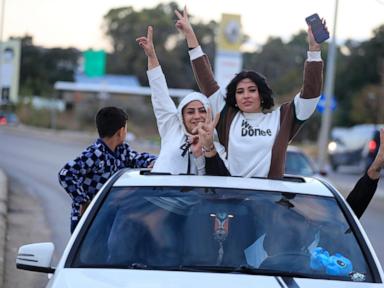ARTICLE AD BOX
El Salvador's gang-busting President Nayib Bukele, who claimed reelection with an overwhelming majority Sunday, has sarcastically embraced the moniker of "dictator" and breezily shrugs off criticism of human rights transgressions.
Riding a wave of support at home and abroad for his no-limit "war" on gangs, the 42-year-old polls as the most popular president in Latin America, possibly the world.
But he has also had the military storm parliament, replaced judges he considered hostile, and overseen the jailing of innocent people, critics say.
On Sunday he defiantly batted away criticism of his government's rounding up of tens of thousands of presumed gangsters.
"Do you expect that we, because we are Salvadorans... because we're second class citizens or something, have to die?" he said in response to a question from a Western journalist.
"They (gangs) have to kill our families, they have to kill our children because your liberal ideas of what a democracy should be have to be respected?" he continued, in English.
Bukele has previously denounced rare protesters for "vandalism," and called independent media and critics liars and defenders of criminality.
He claimed Sunday, before official results were announced, to have swept elections with at least 85 percent of votes cast: a "record in the entire democratic history of the world."
'Devotion'
Bukele is a social media whiz with a sharp beard who spurns convention and often ditches ties and the presidential sash in favor of jeans and a baseball cap -- which he also sported when voting.
A photo with Lionel Messi, a selfie in the rostrum at the United Nations General Assembly: the president posts prodigiously on X, YouTube and Facebook, bypassing traditional platforms to communicate directly -- often in English -- with his millions of fans.
"He fosters a cult of personality; there's devotion to him," analyst Michael Shifter of the Inter-American Dialogue think tank in Washington told AFP.
"His charisma and his communication skills are without peer in Latin America."
Of Palestinian heritage, Bukele is a son of San Salvador, the capital, where he was born in 1981.
He studied law at the Central American University but didn't graduate, and joined his father's business empire of textiles, pharmaceuticals and publicity at the age of 18.
Bukele started his political career in his early 30s, serving as mayor of a San Salvador suburb, and then of the capital itself.
In 2019 he graduated to the presidency -- upending an unpopular, corruption-riddled two-party system in power since El Salvador's civil war ended nearly three decades earlier.
And since March 2022, he has presided over a gang roundup credited with plummeting homicide rates but also criticized for indiscriminate arrests, including of minors, and inhumane prison conditions.
El Salvador's drop in violence is a success the president likes to hammer home online, drowning out grumblings about creeping authoritarianism and economic woes.
"We... changed the murder capital of the world, the world's most dangerous country, into the safest country in the Western Hemisphere," he said Sunday.
'Philosopher King'
Not a fan of criticism, Bukele often resorts to irony online.
He frequently changes his handle on X, formerly Twitter, having self-identified as "dictator of El Salvador" and the "world's coolest dictator" in an ironic nod to detractors.
Today he goes by "Philosopher King."
In spite of an apparent love for banter, Bukele has shown himself to be nothing if not ruthless.
When gangs vowed to kill people at random in a response to his state of emergency, Bukele simply threatened to deprive jailed gangsters of food.
Shortly after taking office, he ordered heavily armed police and soldiers to storm a then opposition-led parliament to intimidate MPs into approving a loan to finance an anti-crime plan.
That led lawmakers to call for a congressional committee to have him declared "mentally incapable" of governing.
Bukele's New Ideas party and its allies subsequently won a majority in the legislative assembly which promptly replaced senior judges and the attorney general -- two institutions with which the president had clashed.
The newly Bukele-aligned Supreme Court allowed him to seek reelection despite a constitutional single-term limit.
Asked Sunday if he would change the law to seek a third term, the president replied: "I don't think constitutional reform is necessary."
He did not make it clear what his future plans were.
Bukele is married to Gabriela Rodriguez, a psychologist and ballet dancer with whom he has two children.
(Except for the headline, this story has not been edited by NDTV staff and is published from a syndicated feed.)
.png)
 9 months ago
20
9 months ago
20








 English (US)
English (US)